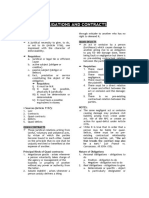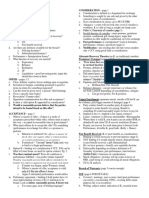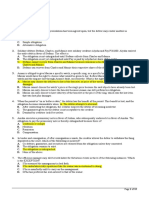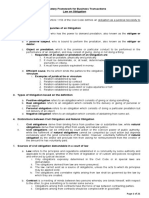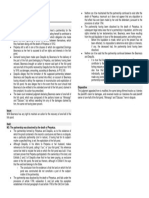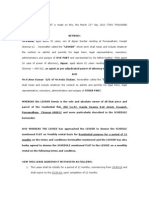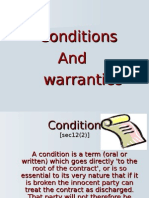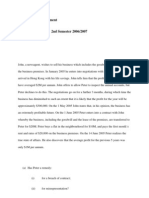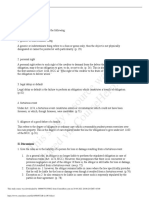0 ratings0% found this document useful (0 votes)
158 viewsThe Following Must Appear in A Public Document
The Following Must Appear in A Public Document
Uploaded by
Mark Anthony Javellana Sicad1. The document discusses the form and substance requirements for contracts under Philippine law. It outlines when certain formalities, like being in writing or being in a public document, are required for a contract's validity, enforceability, or to prove the contract's existence.
2. Key requirements include contracts creating, transferring, or extinguishing real rights over immovable property must be in a public document. Oral contracts are generally valid but limited to the contracting parties.
3. The document also discusses the principle of freedom of contract and exceptions where contracts may be prohibited if they violate law, public policy, morals, or good customs. Contracting parties have flexibility to establish terms unless they are contrary to these limits
Copyright:
© All Rights Reserved
Available Formats
Download as DOCX, PDF, TXT or read online from Scribd
The Following Must Appear in A Public Document
The Following Must Appear in A Public Document
Uploaded by
Mark Anthony Javellana Sicad0 ratings0% found this document useful (0 votes)
158 views8 pages1. The document discusses the form and substance requirements for contracts under Philippine law. It outlines when certain formalities, like being in writing or being in a public document, are required for a contract's validity, enforceability, or to prove the contract's existence.
2. Key requirements include contracts creating, transferring, or extinguishing real rights over immovable property must be in a public document. Oral contracts are generally valid but limited to the contracting parties.
3. The document also discusses the principle of freedom of contract and exceptions where contracts may be prohibited if they violate law, public policy, morals, or good customs. Contracting parties have flexibility to establish terms unless they are contrary to these limits
Original Description:
Oblicon notes
Original Title
Module 7 Notes
Copyright
© © All Rights Reserved
Available Formats
DOCX, PDF, TXT or read online from Scribd
Share this document
Did you find this document useful?
Is this content inappropriate?
1. The document discusses the form and substance requirements for contracts under Philippine law. It outlines when certain formalities, like being in writing or being in a public document, are required for a contract's validity, enforceability, or to prove the contract's existence.
2. Key requirements include contracts creating, transferring, or extinguishing real rights over immovable property must be in a public document. Oral contracts are generally valid but limited to the contracting parties.
3. The document also discusses the principle of freedom of contract and exceptions where contracts may be prohibited if they violate law, public policy, morals, or good customs. Contracting parties have flexibility to establish terms unless they are contrary to these limits
Copyright:
© All Rights Reserved
Available Formats
Download as DOCX, PDF, TXT or read online from Scribd
Download as docx, pdf, or txt
0 ratings0% found this document useful (0 votes)
158 views8 pagesThe Following Must Appear in A Public Document
The Following Must Appear in A Public Document
Uploaded by
Mark Anthony Javellana Sicad1. The document discusses the form and substance requirements for contracts under Philippine law. It outlines when certain formalities, like being in writing or being in a public document, are required for a contract's validity, enforceability, or to prove the contract's existence.
2. Key requirements include contracts creating, transferring, or extinguishing real rights over immovable property must be in a public document. Oral contracts are generally valid but limited to the contracting parties.
3. The document also discusses the principle of freedom of contract and exceptions where contracts may be prohibited if they violate law, public policy, morals, or good customs. Contracting parties have flexibility to establish terms unless they are contrary to these limits
Copyright:
© All Rights Reserved
Available Formats
Download as DOCX, PDF, TXT or read online from Scribd
Download as docx, pdf, or txt
You are on page 1of 8
III.
Form and Substance - equivalent to establishing as an implied condition of
a. Form of contract every contract, that these formal requisites shall be
Art. 1356 complied with, notwithstanding the absence of any
General rule - contracts shall be obligatory, in whatever express agreement by the contracting parties to that effect
form they may have been entered into, provided all the but does not subordinate the principal action to the
essential requisites for their validity are present. secondary action concerning the form.
- intent over form. Our contractual system upholds the - this right may be exercised simultaneously with the action
spirit and intent of the contracting parties over the upon the contract.
formalities. - the fact that the plaintiff has not made use of the same
- sale, lease, contract for services, and partition are does not bar his action on the contract. Neither this
consensual and valid even if they are merely oral. article, the preceding one, nor the following one,
- however, the binding effect of oral contracts is generally requires that the exercise of the action to compel the
limited to the contracting parties. The law usually requires execution of the deed must precede the bringing of the
registration for a contract to be binding on third persons, action derived from the contract.
and an oral contract cannot be registered unless it is Art. 1358
reduced into a public document. - the following must appear in a public document:
Exceptions: 1. acts and contracts which have for their object the
1. When required by law for validity or enforceability creation, transmission, modification, or extinguishment
- called solemn or formal contracts of real rights over immovable property
- donation of immovable property, donation of - sales of real property or of an interest therein are
movables worth more than P5,000,000, contracts governed by Art. 1403, No. 2 and 1405
to pay interest on loans, stipulation limiting the 2. the cession, repudiation, or renunciation of hereditary
liability of carrier, contract of partnership when an rights or of those of the conjugal partnership of gains
immovable is contributed, real estate mortgage, 3. the power to administer property, or any other power
contract of antichresis which has for its object an act appearing or which should
2. When required by law to prove the contract appear in a public document or should prejudice a third
- their existence is not provable by mere oral person.
testimony 4. the cession of actions or rights proceeding from an act
- the form required is for evidentiary purposes only. appearing in a public document.
Thus, the Statute of Frauds would not apply if: - the requirements of a public document are only for
- the contract is wholly or partly executed convenience, not for validity or enforceability
- the parties permit a contract to be proved, - failure to follow the proper form does not invalidate the
without any objection contract, the parties can simply compel each other to
- if the formal requirement has not been complied with, observe that form, once the contract has been
a party cannot seek its enforcement or compel perfected.
compliance with the formal requirement, because the - as to the last paragraph, this does not mean that
law does not recognize any existing or enforceable contracts involving more than P500 are void or
contract to begin with. unenforceable if not in writing. It is not enough that the
TOLENTINO law should require that the contract be in writing. The law
- formalities may be classified into three groups: must further prescribe that without the writing, the
1. those which are required for the validity of the contract is not valid or not enforceable by action.
contract ad esentia, ad solemnitatem b. Stipulation
2. those required to make the contract effective as b.1. freedom of contract
against third parties, such as those mentioned in Art. - a person’s freedom to contract about his own affairs is
1357 and 1358 part of the liberty of the individual under the Constitution.
3. those required for the purpose of proving the However, this freedom is not absolute and must yield to
existence of the contract, or formalities ad the common good.
probationem, such as those provided in the Statute of Art. 1306
Frauds in Art. 1403 - the contracting parties may establish such stipulations,
Art. 1357 clauses, terms and conditions as they may deem
- this article grants to each contracting party the power to convenient, provided they are not contrary to law,
compel the other to execute the formalities required by morals, good customs, public order, or public policy.
the law, as soon as the requisites for the validity of the - law
contract are present.
- applicable laws form part of and are read into the Art. 1491
contract without need for any express reference. - The following persons cannot acquire by purchase,
- examples of contracts or stipulations prohibited by even at a public or judicial auction, either in person or
law: through the mediation of another:
1. pactum commissorium – the creditor cannot (1) The guardian, the property of the person or persons
appropriate things given by way of pledge or who may be under his guardianship;
mortgage or dispose of them. Any stipulation to the (2) Agents, the property whose administration or sale
contrary is null and void. may have been entrusted to them, unless the consent
2. stipulation in contract of employment of the principal has been given;
discrimination against women or prohibiting them (3) Executors and administrators, the property of the
from getting married. estate under administration;
3. an agreement to deprive a court of jurisdiction (4) Public officers and employees, the property of the
conferred on it by law is void. Jurisdiction over an State or of any subdivision thereof, or of any
action is conferred by law and may not be changed government-owned or controlled corporation, or
by mere agreement of the parties. institution, the administration of which has been
- morals and good customs intrusted to them; this provision shall apply to judges
- morals and good customs refer to general principles and government experts who, in any manner
of morality which have received a good measure of whatsoever, take part in the sale;
social acceptance. (5) Justices, judges, prosecuting attorneys, clerks of
- examples: superior and inferior courts, and other officers and
1. iniquitous, exorbitant, and unconscionable employees connected with the administration of
stipulations on interest rates, penalties, and justice, the property and rights in litigation or levied
attorney’s fees upon an execution before the court within whose
2. contracts for domestic services without payment jurisdiction or territory they exercise their respective
of wages are void functions; this prohibition includes the act of acquiring
- public policy or public order by assignment and shall apply to lawyers, with respect
- public policy or public order refers to the public good to the property and rights which may be the object of
or the interest of the society. No person can lawfully any litigation in which they may take part by virtue of
do that which has a tendency to be injurious to the their profession.
public or against the public good. (6) Any others specially disqualified by law. (1459a)
- examples: Art. 1782
1. stipulation that a credit card holder who reported - Persons who are prohibited from giving each other any
loss/theft of his credit card continues to be liable for donation or advantage cannot enter into universal
unauthorized charges until the credit company partnership. (1677)
notifies its member establishment. Such clause Art. 1799
leaves the holder at the mercy of the credit card - A stipulation which excludes one or more partners from
company. any share in the profits or losses is void. (1691)
2. agreement to stifle prosecution of a crime it would Art. 2088
be detrimental to the administration of justice. - The creditor cannot appropriate the things given by way
- non-involvement clauses (those which prevent an of pledge or mortgage or dispose of them. Any
employee from working for another employer) are, in stipulation to the contrary is null and void. (1859a)
general, valid if there are reasonable limitations as to Art. 2130
time, trade, and place, and if they are not greater than - A stipulation forbidding the owner from alienating the
is necessary to afford a fair and reasonable protection immovable mortgaged shall be void. (n)
to the employer. Art. 87, FC
Art. 1490 - Every donation or grant of gratuitous advantage, direct
- The husband and the wife cannot sell property to each or indirect, between the spouses during the marriage
other, except: shall be void, except moderate gifts which the spouses
(1) When a separation of property was agreed upon in may give each other on the occasion of any family
the marriage settlements; or rejoicing. The prohibition shall also apply to persons
(2) When there has been a judicial separation or living together as husband and wife without a valid
property under Article 191. (1458a) marriage. (133a)
b.2. interpretation - where the contract is contained in several
- interpretation is the act of making intelligible what was documents, all of them must be taken together to
before not understood, ambiguous, or not obvious. determine the intention of the parties.
- it is a method by which the meaning of language is - all circumstances may be proved, necessary for a
ascertained. correct interpretation of the contract, and the court
- the interpretation of a contract is the determination of should consider them in order to give effect to the
the meaning attached to the words written or spoken true intention of the contracting parties.
which make the contract. PEREZ
i. plain meaning - how to determine the intention:
Art. 1370 1. contemporaneous and subsequent acts (Art. 1371)
- if the terms of a contract are clear and leave no doubt 2. scope of terms (Art. 1372)
upon the intention of the contracting parties, the 3. most effectual interpretation (Art. 1373)
literal meaning of its stipulations shall control. 4. holistic interpretation (Art. 1374)
- where the language of a written contract is clear 5. consistency with the nature and object (Art. 1375)
and unambiguous, there is no room for construction. 6. usage or custom (Art. 1376)
The contract must be taken to mean that which, on iii. stipulations with different possible meanings
its face, it purports to mean, unless some good Art. 1375
reason can be assigned to show that the words - words which may have different significations shall be
should be understood in a different sense. understood in that which is most in keeping with the
- whatever is not found in the writing must be nature and object of the contract
understood as waived and abandoned. - when there is doubt as to the meaning of any
- the language of a writing is to be interpreted particular language, it should be determined by a
according to the legal meaning it bears in the place consideration of the general scope and purpose of
of its execution, unless the parties have reference to the instrument in which it occurs.
a different place. iv. interpretation of terms
ii. evident intention Art. 1372
Art. 1370 - however general the terms of a contract may be, they
- if the words appear to be contrary to the evident shall not be understood to comprehend things that are
intention of the parties, the latter shall prevail over the distinct and cases that are different from those upon
former. which the parties intended to agree.
- the evident intention which prevails against the - when a general and a particular provision are
defective wording of the contract is not that of one inconsistent, the latter is paramount to the former.
of the parties but the general intent, which, being so, Art. 1373
is to a certain extent equivalent to mutual consent, - if some stipulation of any contract should admit of
inasmuch as it was the result desired and intended several meanings, it shall be understood as bearing
by the contracting parties. that import which is most adequate to render it
- where, due to mistake, fraud, inequitable conduct, effectual.
or accident, the language used in an instrument does Art. 1376
not fully or accurately express the agreement or - the usage or custom of the place shall be borne in
intention of the parties, the court will order a mind in the interpretation of the ambiguities of a
reformation of such instrument. contract and shall fill the omission of stipulations
- the failure of a contract to express the true intent which are ordinarily established.
of the parties should be expressly put in issue in the - an instrument may be construed according to
pleadings whether the action is for reformation or usage, in order to determine its true character
annulment of the contract, before parol evidence Art. 1377
may be admitted. - the interpretation of obscure words or stipulations in
Art. 1371 a contract shall not favor the party who caused the
- in order to judge the intention of the contracting obscurity (contra proferentum)
parties, their contemporaneous and subsequent acts - any ambiguity is to be taken contra proferentum,
shall be principally considered. i.e., construed against the party who drafted the
- the court can look into extrinsic evidence, outside contract and caused the ambiguity which could have
the four corners of the written contract been avoided by the exercise of a little more care
- when the terms of an agreement have been
intended in a different sense by the different parties
to it, that sense is to prevail against either party in - where the contract is onerous, the doubt shall
which he supposed the other understood it, and be settled in favor of the greatest reciprocity of
when different constructions of a provision are interests
otherwise equally proper, that is to be taken which is - where a contract is susceptible of being
the most favorable to the party in whose favor the interpreted as a sale with right of repurchase,
provision was made. and as a loan with mortgage, the latter
- any ambiguity, obscurity or doubt in a contract of interpretation is to be followed because it is in
adhesion is construed or resolved strictly against the favor of the greater reciprocity of interests.
party who prepared it. 2. if the doubts are cast upon the principal object of
- this is because there is an imposition by one party the contract in such a way that it cannot be known
upon another who accepts the terms of a contract what may have been the intention of will of the
already prepared by the former, by reason of parties, the contract shall be null and void
necessity which curtails his bargaining power. vi. application of the Rules of Court
- a contract of adhesion is a contract between two Art. 1379
parties, where the terms and conditions of the - the principles of interpretation stated in Rule 123
contract are set by one of the parties, and the (Rule 130?) of the Rules of Court shall likewise be
other has little or no ability to negotiate more observed in the construction of contracts
favorable terms and is thus placed in a “take it or - Rule 130 provides for the following rules in the
leave it” position interpretation of documents:
v. settlement of doubts 1. interpretation of a writing according to its legal
Art. 1374 meaning – the language of a writing is to be
- the various stipulations of a contract shall be interpreted according to the legal meaning it bears
interpreted together, attributing to the doubtful ones in the place of its execution, unless the parties
that sense which may result from all of them taken intended otherwise (Sec. 10)
jointly. 2. instrument construed so as to give effect to all
- in the construction of an instrument where there provisions – in the construction of an instrument
are several provisions or particulars, such a where there are several provisions or particulars,
construction is, if possible, to be adopted as will give such a construction is, if possible, to be adopted as
effect to all. will give effect to all (Sec. 11)
- a contract cannot be construed by parts, but its 3. interpretation according to intention; general and
clauses should be interpreted in relation to one particular provisions – in the construction of an
another instrument, the intention of the parties is to be
- certain stipulations cannot be segregated and then pursued; and when a general and a particular
made to control; neither do particular words or provision are inconsistent, the latter is paramount to
phrases necessarily determine the character of a the former, so a particular intent will control a
contract general one that is inconsistent with it (Sec. 12)
Art. 1378 4. interpretation according to circumstances – for
- when it is absolutely impossible to settle doubts by the proper construction of an instrument, the
the rules established in Art. 1370-1377, the following circumstances under which it was made, including
rules apply: the situation of the subject thereof and of the parties
1. if the doubts refer to incidental circumstances to it, may be shown, so that the judge may be placed
- where the contract is gratuitous, the least in the position of those whose language he is to
transmission of rights and interests shall prevail interpret (Sec. 13)
- construction which would amount to 5. peculiar signification of terms – the terms of a
impairment or loss of right is not favored; writing are presumed to have been used in their
conservation and preservation, not waiver, primary and general acceptation, but evidence is
abandonment or forfeiture of a right, is the admissible to show that they have a local, technical,
rule or otherwise peculiar signification, and were so used
- where the terms of the contract are not clear and understood in the particular instance, in which
on the period of redemption, that period is to case the agreement must be construed accordingly
be interpreted as being indefinite or unlimited (Sec. 14)
as it provides for the least transmission of 6. written words control printed – when an
rights or interests between the contracting instrument consists partly of written words and
parties
partly of a printed form, and the two are rescinded by creditors prior to the contract, upon
inconsistent, the former controls the latter (Sec. 15) showing that the debtor is insolvent, and within a
7. experts and interpreters to be used in explaining prescription period of four years.
certain writings – when the characters in which an 2. relative – takes place when the parties conceal their
instrument is written are difficult to be deciphered, agreement
or the language is not understood by the court, the - the real or true agreement is binding on the parties,
evidence of persons skilled in deciphering the provided that:
characters, or who understand the language, is 1. it does not prejudice a third person
admissible to declare the characters of the meaning 2. it is not intended for any purpose contrary to
of the language (Sec. 16) law, morals, good customs, public order, or public
8. of two constructions, which preferred – when the policy
terms of an agreement have been intended in a - two juridical acts involved in relative simulation:
different sense by the different parties to it, that 1. the ostensible act – also called apparent or
sense is to prevail against either party in which he fictitious; the contract that the parties pretend to
supposed the other understood it, and when have executed
different constructions of a provision are otherwise 2. the hidden act – also called real; the true
equally proper, that is to be taken which is the most agreement between the two parties
favorable to the party in whose favor the provision - if the concealed or hidden act is lawful, it is
was made (Sec. 17) enforceable if the essential requisites are
9. construction in favor of a natural right – when an present, such as when the true consideration
instrument is equally susceptible of two was not stated.
interpretations, one is in favor of a natural right and Art. 1346
the other against it, the former is to be adopted (Sec. - an absolutely simulated or fictitious contract is void
18) because consent is totally absent; there is no intent to be
10. interpretation according to usage – an bound
instrument may be construed according to usage, in - if the absolute simulation does not have an illicit
order to determine its true character (Sec. 19) purpose, the parties to the contract may prove the
b.3. simulation of contracts simulation in order to recover whatever may have
- simulation occurs when an apparent contract is a been given under such simulated act.
declaration of a fictitious will, deliberately made by - but if the simulated contract has an illegal object,
agreement of the parties, in order to produce, for the the provisions of Art. 1411 and 1412 will apply
purposes of deception, the appearance of a juridical act - a relative simulation, when it does not prejudice a third
which does not exist or is different from that which was person and is not intended for any purpose contrary to
really executed. law, morals, good customs, public order or public policy
- requisites of simulation: binds the parties to their real agreement.
1. an outward declaration of will different from the will - a third person may avail himself of the conduct of the
of the parties parties to the simulated contract which is most favorable
2. the false appearance must have been intended by to him. The simulated contract will therefore be binding
mutual agreement if it is favorable to him to consider it so.
3. the purpose is to deceive third persons - this is not only a protection to him who has relied in
Art. 1345 good faith upon appearances, but a penalty to those
- types of simulation: who conceal their act from innocent third persons.
1. absolute – takes place when the parties do not - but a third person, if he is prejudiced, may invoke the
intend to be bound at all nullity of a simulated contract
- an absolutely simulated contract must be c. Reformation
distinguished from a fraudulent contract or - reformation is a remedy whereby a written instrument is
alienation. made or construed so as to express of conform to the real
- in absolutely simulated contracts, no contract intention of the parties, where some mistake, fraud,
really exists or was intended; it may thus be inequitable conduct or accident has occurred or been
attacked by any creditor, at any time, and even if committed.
the debtor is not insolvent - in granting reformation, the court is not making a new
- in fraudulent alienation, a contract exists and was contract for the parties but establishing and perpetuating
intended to take effect (for a fraudulent purpose). the real contract between the parties which, under the
If intended to defraud a creditor, it may be
technical rules of law, could not be enforced but for such Art. 1365
reformation. - if two parties agree upon the mortgage or pledge of real
- the rationale of the doctrine is that it would be unjust and or personal property, but the instrument states that the
inequitable to allow the enforcement of a written property is sold absolutely or with a right of repurchase,
instrument which does not reflect or disclose the real reformation of the instrument is proper.
meeting of the minds of the parties. - the intention of the parties may be inferred from their
c.1. requisites simultaneous or subsequent acts, as well as from the
Art. 1359 stipulations themselves in the contract
- when, there having been a meeting of the minds of the Art. 1368
parties to a contract, their true intention is not expressed - reformation may be ordered at the instance of either
in the instrument purporting to embody the agreement, party or his successors in interest, if the mistake was
by reason of mistake, fraud, inequitable conduct or mutual; otherwise, upon petition of the injured party, or
accident, one of the parties may ask for the reformation his heirs and assigns.
of the instrument to the end that such true intention c.2. when not allowed
may be expressed. Art. 1366
- if mistake, fraud, inequitable conduct, or accident has - there shall be no reformation in the following cases:
prevented a meeting of the minds of the parties, the 1. simple donations inter vivos wherein no condition is
proper remedy is not reformation of the instrument but imposed
annulment of the contract. 2. wills
- in order that an action for reformation of instruments - donations and wills a re purely gratuitous
may prosper, the following requisites must concur: dispositions of property, so the law will not normally
1. there must have been a meeting of the minds of the interfere with how the donor or testator wanted to
parties to the contract dispose of his property.
2. the instrument or document evidencing the contract - an action to reform a written instrument is in the
does not express the true agreement between the nature of an action for specific performance and
parties requires a valuable consideration – an element
- the presumption is that an instrument sets out the lacking as between donor and done, and between
true agreement of the parties thereto, thus, the testator and beneficiary
burden of proving otherwise is on the party who - Art. 789 provides that “when there is an imperfect
insists that the contract should be reformed. description, or when no person or property exactly
3. the failure of the instrument to express the answers the description, mistakes and omissions
agreement must be due to mistake, fraud, inequitable must be corrected, if the error appears from the
conduce, or accident. context of the will or from extrinsic evidence.” This
- reformation distinguished from annulment refers merely to errors or imperfections in the
- reformation presupposes that there is a valid existing description, not to the manner of disposition.
contract between the parties, and only the document - Art. 1366 is the general rule while Art. 789 is an
or instrument which was drawn up and signed by them exception
does not correctly express the terms of their 3. when the real agreement is void
agreement - reformation would be useless if the actual
- annulment is proper if the minds of the parties did agreement is void and cannot be enforced.
not meet, or if the consent of either one was vitiated - power of a court to reform a written instrument is
by violence or intimidation or mistake or fraud, so that not for accomplishing a vain thing.
no real and valid contract was made Art. 1367
- reformation gives live to the contract upon certain - when one of the parties has brought an action to
corrections enforce the instrument, he cannot subsequently ask for
- annulment involves a complete nullification of the its reformation
contract - ESTOPPEL!
- upon the reformation of an instrument, the general rule - courts deny relief of reformation when the party
is that it relates back to, and takes effect from the time seeking reformation has brought an action to enforce
of its original execution, especially as between the the instrument, because there has been an election as
parties. between inconsistent remedies, one in affirmance of the
- the statue of frauds is no impediment to the written contract and the other in disaffirmance.
reformation of an instrument - the party suing under the written contract may be
said to have ratified the same.
c.3. concurrence of grounds - in order to be a ground for reformation the fraud or
Art. 1361 inequitable conduct of the other party must be clearly
- when a mutual mistake of the parties causes the failure shown, and must be at the time of the execution of the
of the instrument to disclose their real agreement, said instrument
instrument may be reformed. - inequitable conduct, to warrant relief by way of
- requisites of mistake: reformation, has been held to consist in doing acts, or
1. that the mistake is one of fact omitting to do acts, which the court finds to be
- there is a mistake of fact when the written evidence unconscionable
of the agreement includes something which should - as in taking advantage of one party’s illiteracy, in
not be there, or omits from such instrument drafting or having drafted an instrument contrary to
something which should be there, or so expresses the previous understanding of the parties and
their agreement that it sets forth something making such party believe the instrument to be other
different from what was intended than what it actually is.
2. that it was common to both parties - the mistake of one party must refer to the contents
- where mistake alone is relied on as a ground for of the instrument, and not the subject matter or
reformation, the mistake must be a mutual mistake. principal conditions of the agreement; in the latter
- it must appear that by reason of the mistake case an action for annulment of the contract is the
something is to be done which neither party proper remedy.
intended c.4. 3rd party fault
- the mistake must be in reference to the same Art. 1364
matter - when through the ignorance, lack of skill, negligence or
- the parties must have come to an oral agreement bad faith on the part of the person drafting the
before they attempted to reduce it to writing, which instrument or of the clerk or typist, the instrument does
attempt failed by reason of mistake, and reformation not express the true intention of the parties, the courts
enforces the original agreement may order that the instrument be reformed.
- the rule that mistake in expression must be mutual - the clerk, un reducing to writing the agreements of
means, therefore, that to obtain reformation the the contracting parties, acts upon the direction of the
parties must show that there was a valid contract parties and, as such, he stands as an agent of the
between them, which contract is not correctly set parties to that extent
forth in the writing to be reformed. - satisfactory proof of the agent’s mistake is proof of
3. the proof of mutual mistake must be clear and the mutual mistake of the contracting parties.
convincing - furthermore, since the written contract fails to
- the amount of evidence necessary to sustain a express the agreement on which the minds of the
prayer for relief where it is sought to impugn a fact parties met, it is not theirs, and the true agreement has
in a document is always more than a mere not been executed; hence, the necessity of
preponderance of evidence. reformation.
- where the evidence of a mutual mistake is clear and c.5. applicable law
decisive, the refusal to rectify on the sole ground of the Art. 1360
negligence of the complaining party may well work the - the principles of general law on the reformation of
gravest injustice and defeat the intention of both parties instruments are hereby adopted insofar as they are not
entering into the agreement. in conflict with the provisions of this Code
- where there has been a mutual mistake and one party - JBL Reyes: “this is another case of those vague
has been as negligent as the other, refusal to reform a references that abound in the Code. Such
contract made under such circumstances would have indefiniteness amounts to a delegation of power to the
the effect of penalizing one party for negligent Courts to determine what the law is, since no
conduct, and at the same time permitting the other standards are set to enable one to determine which
party not merely to escape the consequences of his law is meant.”
negligence, but in most cases to profit thereby. Art. 1369
Art. 1362 - the procedure for the reformation of instrument shall
- if one party was mistaken and the other acted be governed by the rules of court to be promulgated by
fraudulently or inequitably in such a way that the the Supreme Court.
instrument does not show their true intention, the - under the Rules of Court, the rules on declaratory
former may ask for the reformation of the instrument. relief apply to actions for reformation of instrument
- prescriptive period of 10 years (Art. 1144), counted
from the time the right of action accrues, i.e., the time
the other party manifests an intention (by overt acts)
not to abide by the true agreement of the parties (not
necessarily the time of execution of the contract)
You might also like
- Obligations and Contracts by de Leon ReviewerDocument16 pagesObligations and Contracts by de Leon ReviewerCazia Mei Jover92% (13)
- Obligations and Contracts LectureDocument28 pagesObligations and Contracts LectureMila Casandra CastañedaNo ratings yet
- Contract Attack OutlineDocument4 pagesContract Attack OutlineKatherine McClintockNo ratings yet
- MCQ ObliconDocument18 pagesMCQ ObliconDiane Uy100% (2)
- Contracts Chapter 3 Form of ContractsDocument9 pagesContracts Chapter 3 Form of ContractsAira MalinabNo ratings yet
- Natural Obligations QandaDocument5 pagesNatural Obligations QandaFloramae PasculadoNo ratings yet
- 6295d1e06f5c6 Cpale RFBT ReviewerDocument15 pages6295d1e06f5c6 Cpale RFBT ReviewerKimNo ratings yet
- Act 3952 (Bulk Sales Law)Document2 pagesAct 3952 (Bulk Sales Law)toshkenbergNo ratings yet
- CTDI Final Pre-Board Special Laws Only PDFDocument4 pagesCTDI Final Pre-Board Special Laws Only PDFPatricia Marie MercaderNo ratings yet
- Regulatory Framework For Business Transactions PDFDocument110 pagesRegulatory Framework For Business Transactions PDFcath100% (1)
- 23 Review Material 23 RFBTDocument21 pages23 Review Material 23 RFBT버니 모지코No ratings yet
- Law On Business Transactions: Atty. Karen Rodriguez de LeonDocument61 pagesLaw On Business Transactions: Atty. Karen Rodriguez de LeonRosemarie A. EnorNo ratings yet
- Oblicon de Leon SummaryDocument57 pagesOblicon de Leon SummaryEl AgricheNo ratings yet
- Oblicon Deptal ReviewerDocument25 pagesOblicon Deptal ReviewerAgent348No ratings yet
- Article 1582. Primary Obligations of The VendeeDocument8 pagesArticle 1582. Primary Obligations of The Vendeehyunsuk fhebieNo ratings yet
- DasdsaDocument34 pagesDasdsaFrederick TaylorNo ratings yet
- Morales, Noemi Alodia D. Draw and Outline General ProvisionsDocument3 pagesMorales, Noemi Alodia D. Draw and Outline General ProvisionsNoemiAlodiaMoralesNo ratings yet
- BLAW Quiz in Essential Requisite of ContractsDocument2 pagesBLAW Quiz in Essential Requisite of ContractsWyn Dignos100% (1)
- PAS 2 Inventories MeasurementDocument6 pagesPAS 2 Inventories Measurementcamille joi florendoNo ratings yet
- Midterm Exam in ObliconDocument1 pageMidterm Exam in ObliconJAY ROME CASTILLANONo ratings yet
- Module 1 Law On SalesDocument52 pagesModule 1 Law On SalesSandra DoriaNo ratings yet
- 25 Review Mat 25Document11 pages25 Review Mat 25버니 모지코No ratings yet
- "Obligatio" Which Means A "Tying" or "Binding."Document26 pages"Obligatio" Which Means A "Tying" or "Binding."Stephanie AndalNo ratings yet
- CHAPTER 6 (Arts. 1380-1389)Document6 pagesCHAPTER 6 (Arts. 1380-1389)Kaye RabadonNo ratings yet
- General Provisions Summary NotesDocument4 pagesGeneral Provisions Summary Notesfklakjdkjfla100% (1)
- Business Law Activity 4Document6 pagesBusiness Law Activity 4sandra seguienteNo ratings yet
- REGULATORY FRAMEWORK AND LEGAL ISSUES IN BUSINESS AE15 Modules 78Document1 pageREGULATORY FRAMEWORK AND LEGAL ISSUES IN BUSINESS AE15 Modules 78Jeff La Vidad100% (1)
- FileDocument33 pagesFileMarvin100% (1)
- Case Digests: Articles 1767 To 1783Document2 pagesCase Digests: Articles 1767 To 1783Sam Fajardo100% (1)
- 06 Estate Tax PayableDocument12 pages06 Estate Tax PayableJabonJohnKennethNo ratings yet
- Finals - Business Laws and RegulationsDocument12 pagesFinals - Business Laws and RegulationsArlene DacpanoNo ratings yet
- Philippine Competition Act 2023Document5 pagesPhilippine Competition Act 2023Michael Bongalonta100% (1)
- Obicon FinalDocument32 pagesObicon FinalJessNo ratings yet
- Chapter 1 - Fundamental Concepts of Donor's Taxation (Notes)Document3 pagesChapter 1 - Fundamental Concepts of Donor's Taxation (Notes)Angela Denisse FranciscoNo ratings yet
- Ge 20 Reading Visual Arts Second Exam PDFDocument2 pagesGe 20 Reading Visual Arts Second Exam PDFJOHNSON CORONAS100% (1)
- Law On Sales Agency and Credit TransactionsDocument2 pagesLaw On Sales Agency and Credit TransactionsYanaNo ratings yet
- Oblicon ReviewerDocument6 pagesOblicon ReviewerFranz Danielle DatuNo ratings yet
- TAX Chapter 1-2 - Intoduction To Taxation - QuizDocument6 pagesTAX Chapter 1-2 - Intoduction To Taxation - QuizRejay VillamorNo ratings yet
- Escano Versus Heirs of EscanoDocument1 pageEscano Versus Heirs of EscanoRogelio Rubellano IIINo ratings yet
- AgencyDocument7 pagesAgencyNosliw NonayatnabNo ratings yet
- Law On Sales, Agency and Credit Transactions Part 4Document60 pagesLaw On Sales, Agency and Credit Transactions Part 4PierreNo ratings yet
- How Defective Contracts Are ClassifiedDocument2 pagesHow Defective Contracts Are Classifiedaccounts 3 lifeNo ratings yet
- Reviewer in ObliconDocument11 pagesReviewer in Obliconjastine labradoresNo ratings yet
- Joint and Solidary Liability Mini ReviewerDocument4 pagesJoint and Solidary Liability Mini ReviewerRobinson FloresNo ratings yet
- Oblicon Reviewer - (Art. 1386-87)Document3 pagesOblicon Reviewer - (Art. 1386-87)Mark David DaculaNo ratings yet
- Resolutory ConditionDocument2 pagesResolutory ConditionZaira PangesfanNo ratings yet
- RFBT (Pinnacle Notes)Document1 pageRFBT (Pinnacle Notes)Justz LimNo ratings yet
- Contracts: Formality of Contracts To Voidable ContractsDocument37 pagesContracts: Formality of Contracts To Voidable ContractsDeryl GalveNo ratings yet
- (Reviewer) Law-on-Agency (APC 2020 Ed.)Document4 pages(Reviewer) Law-on-Agency (APC 2020 Ed.)Carl Joshua Dayrit100% (1)
- De Leon, Bianca MhaeDocument7 pagesDe Leon, Bianca MhaeBianca Mhae De LeonNo ratings yet
- Chapter 1: Nature and Form of The Contract: 1459, However, Does Not Require That The Vendor Must Have TheDocument10 pagesChapter 1: Nature and Form of The Contract: 1459, However, Does Not Require That The Vendor Must Have TheMarlon Amiel SungaNo ratings yet
- Frequently Asked Questions - TrademarksDocument4 pagesFrequently Asked Questions - Trademarkspeanut47No ratings yet
- Gross Income TaxationDocument8 pagesGross Income TaxationJenelyn FloresNo ratings yet
- Oblicon Final TermDocument8 pagesOblicon Final Termjohn sinNo ratings yet
- Consumer Protection Act NotesDocument6 pagesConsumer Protection Act NotesAbarilles, Sherinah Mae P.No ratings yet
- Syllabus For Law On PartnershipDocument6 pagesSyllabus For Law On PartnershipEllorango, Teotimo III M. BSA 1-ENo ratings yet
- NOTES (Quiz 1 - Articles 1767-1809)Document2 pagesNOTES (Quiz 1 - Articles 1767-1809)Gianina Erin DomingoNo ratings yet
- Business Laws and Regulations PPP1 PDF1Document59 pagesBusiness Laws and Regulations PPP1 PDF1Keight NuevaNo ratings yet
- Regulatory Framework For Business Transactions: ST NDDocument9 pagesRegulatory Framework For Business Transactions: ST NDMark Domingo MendozaNo ratings yet
- 1 Introduction To Business TaxesDocument69 pages1 Introduction To Business TaxesJannet OmolonNo ratings yet
- Far Eastern University - Manila: Open Using Adobe Reader and PCDocument5 pagesFar Eastern University - Manila: Open Using Adobe Reader and PCKristine TiuNo ratings yet
- Obli 1356-1390 PDFDocument10 pagesObli 1356-1390 PDFCMLNo ratings yet
- Three Categories of Unenforceable ContractsDocument6 pagesThree Categories of Unenforceable ContractsMark Anthony Javellana SicadNo ratings yet
- 02 Manila Steamship Co v. AbdulhamanDocument2 pages02 Manila Steamship Co v. AbdulhamanMark Anthony Javellana SicadNo ratings yet
- 05 A. Magsaysay, Inc. V Anastacio AganDocument1 page05 A. Magsaysay, Inc. V Anastacio AganMark Anthony Javellana SicadNo ratings yet
- 09 Bearneza v. DequillaDocument1 page09 Bearneza v. DequillaMark Anthony Javellana SicadNo ratings yet
- 06 CIR v. CA and S.C. JohnsonDocument2 pages06 CIR v. CA and S.C. JohnsonMark Anthony Javellana SicadNo ratings yet
- 03 Pacific Commercial Company v. AboitizDocument1 page03 Pacific Commercial Company v. AboitizMark Anthony Javellana SicadNo ratings yet
- 01 Commissioner v. BatangasDocument2 pages01 Commissioner v. BatangasMark Anthony Javellana SicadNo ratings yet
- 14 John Hay People's Alternative Coalition v. Victor LimDocument2 pages14 John Hay People's Alternative Coalition v. Victor LimMark Anthony Javellana SicadNo ratings yet
- Emeral Garment v. HD LeeDocument1 pageEmeral Garment v. HD LeeMark Anthony Javellana SicadNo ratings yet
- 04 CIR v. St. Lukes Medical Center IncDocument3 pages04 CIR v. St. Lukes Medical Center IncMark Anthony Javellana SicadNo ratings yet
- 16 CIR v. Procter and Gamble (1988)Document1 page16 CIR v. Procter and Gamble (1988)Mark Anthony Javellana SicadNo ratings yet
- 15 Coconut Oil Refiners v. TorresDocument3 pages15 Coconut Oil Refiners v. TorresMark Anthony Javellana SicadNo ratings yet
- 18 CIR V Wander PhilippinesDocument1 page18 CIR V Wander PhilippinesMark Anthony Javellana SicadNo ratings yet
- 02 Soriano vs. Secretary of FinanceDocument1 page02 Soriano vs. Secretary of FinanceMark Anthony Javellana SicadNo ratings yet
- 07 Durban Apartments V Pioneer Insurance and Surety Corp.Document2 pages07 Durban Apartments V Pioneer Insurance and Surety Corp.Mark Anthony Javellana SicadNo ratings yet
- 04 Baron V DavidDocument2 pages04 Baron V DavidMark Anthony Javellana SicadNo ratings yet
- 158 Simon v. CHRDocument24 pages158 Simon v. CHRMark Anthony Javellana SicadNo ratings yet
- Should They Deem It Necessary and Convenient For Its ManagementDocument2 pagesShould They Deem It Necessary and Convenient For Its ManagementMark Anthony Javellana SicadNo ratings yet
- 01 Samson v. Sps. GaborDocument3 pages01 Samson v. Sps. GaborMark Anthony Javellana SicadNo ratings yet
- (Partnership Distinguished From Other Contracts) Sicad, Mark Anthony J. Heirs of Tan Eng Kee V. CaDocument1 page(Partnership Distinguished From Other Contracts) Sicad, Mark Anthony J. Heirs of Tan Eng Kee V. CaMark Anthony Javellana SicadNo ratings yet
- Feb 8 NotesDocument5 pagesFeb 8 NotesMark Anthony Javellana SicadNo ratings yet
- Obligations and ContractsDocument5 pagesObligations and ContractsRomar MarianoNo ratings yet
- 13 BibliographyDocument8 pages13 BibliographyNiharikaNo ratings yet
- MGT611 Midterm Mega File 2023Document26 pagesMGT611 Midterm Mega File 2023Dua NoorNo ratings yet
- Restitution Unjust Enrichment Mugger NotesDocument5 pagesRestitution Unjust Enrichment Mugger NoteskeepthyfaithNo ratings yet
- Causation & Remoteness of DamagesDocument10 pagesCausation & Remoteness of DamagesTee Khai Chen100% (1)
- Obligations. They Are To Be Distinguished From Natural Obligations Which, Not Being Based OnDocument8 pagesObligations. They Are To Be Distinguished From Natural Obligations Which, Not Being Based OnErlinda Navallo100% (1)
- Valid Contract AssignmentDocument6 pagesValid Contract AssignmentKiran100% (1)
- RFBT.O 1602.law On Contracts WithanswersDocument42 pagesRFBT.O 1602.law On Contracts WithanswersDanielle Nicole Marquez0% (1)
- BSL 605 - Lecture 2 PDFDocument40 pagesBSL 605 - Lecture 2 PDFShivati Singh KahlonNo ratings yet
- SBAA1302Document130 pagesSBAA1302prabal parasharNo ratings yet
- Rental Agreement SampleDocument4 pagesRental Agreement SamplearunspeakersNo ratings yet
- Discharge of ContractDocument38 pagesDischarge of Contractvijay chittiboyina100% (1)
- OBLICON (Atty Rachel Castro)Document23 pagesOBLICON (Atty Rachel Castro)KrisLarrNo ratings yet
- Conditions and WarrantiesDocument11 pagesConditions and Warrantiespalavi79% (14)
- Contract LawDocument56 pagesContract LawDownload_Scribd_stuf0% (1)
- Case StudyDocument9 pagesCase StudyrinkymukherjeeNo ratings yet
- ადამინაის უფლებების დაცვა საქართველოში სისხლის სამართლის მართლმსაჯულების კონტექსტშიDocument283 pagesადამინაის უფლებების დაცვა საქართველოში სისხლის სამართლის მართლმსაჯულების კონტექსტშიtsitsia megutnishviliNo ratings yet
- John Uff - Construction Law - 11th Edition 2013 61Document1 pageJohn Uff - Construction Law - 11th Edition 2013 61VarunNo ratings yet
- Maxims of EquityDocument19 pagesMaxims of EquityRikesh Jhumry100% (1)
- This Study Resource Was: I. DefinitionsDocument5 pagesThis Study Resource Was: I. DefinitionsCresenciano MalabuyocNo ratings yet
- ConditionsDocument2 pagesConditionsAnissa GeddesNo ratings yet
- OBLICON de Leon 1156 1304 OutlineDocument24 pagesOBLICON de Leon 1156 1304 OutlineRoyce HernandezNo ratings yet
- Doctrine of PrivityDocument5 pagesDoctrine of PrivityRANDAN SADIQNo ratings yet
- Gpol TUT 4 - TOPIC 3 (PART A) CompletedDocument2 pagesGpol TUT 4 - TOPIC 3 (PART A) CompletedChan Ying ShanNo ratings yet
- The Law of Contract in South Africa: Fifth EditionDocument9 pagesThe Law of Contract in South Africa: Fifth Editionrayzvomuya063No ratings yet
- 57sales Outline eDocument34 pages57sales Outline eblade1111No ratings yet
- Privity of ContractDocument12 pagesPrivity of ContractR100% (1)

